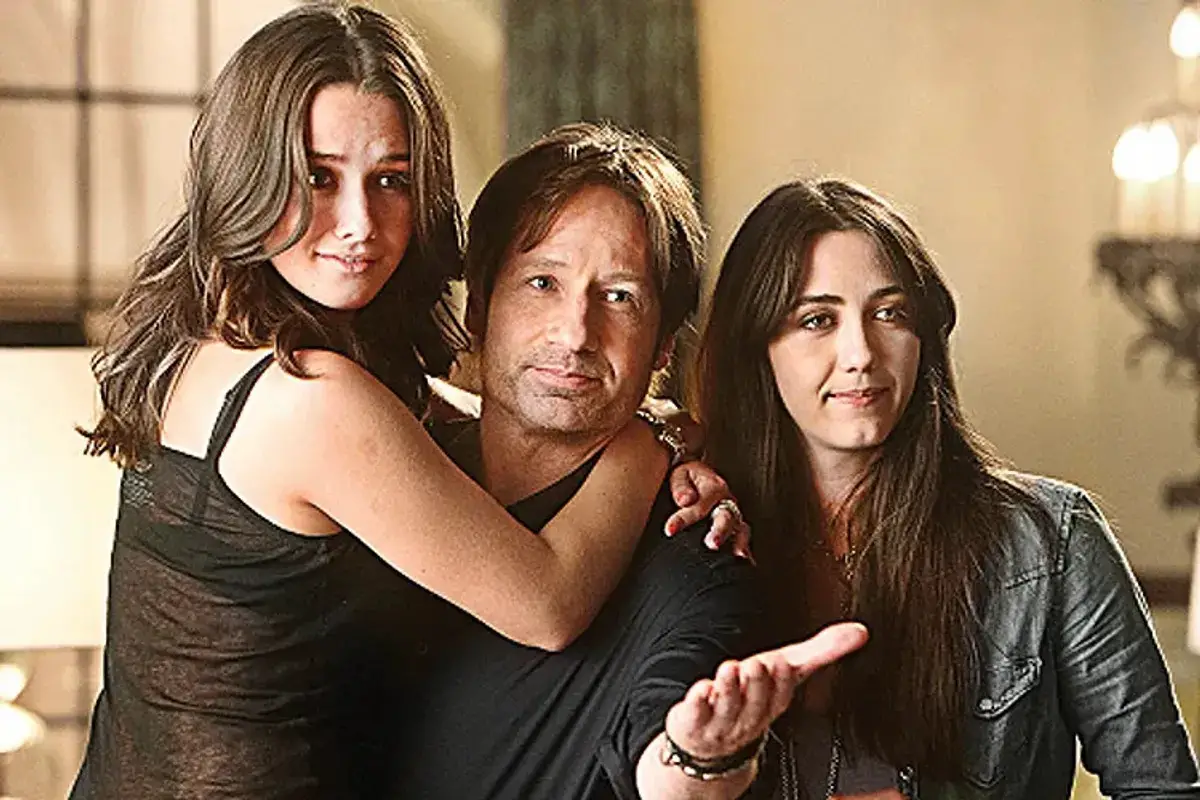“You can’t always get what you want!” The famous lyrics ring as the screen fades from black and shows a black Porsche as it drives up an elegantly long road, complete with fountains and freshly trimmed grass. The scene looks pretty but is unfortunately not real; it is from the pilot of Tom Kapinos’ 2007 television show “Californication.” The show was immediately thrust into controversy by a heated debate with the Red Hot Chili Peppers, given the name’s striking resemblance to their 1999 award-winning album. However, Kapinos took the catchy name far past its sexual implications.
I was first introduced to the show as a teenager in a cramped basement and surrounded by a group of enthused 15-year-olds. Zeke, Liam, Abhi and I gawked at the screen, drowning our fingers in buttery popcorn as we observed the tumultuous life of downright horrid womanizer Hank Moody. In the episode, Moody maneuvers his way around three separate affairs, as well as the one-sided romantic feelings (you can guess which way they went) that were involved. It was beautiful, at the time. It’s somewhat pathetic to say now, but my friends and I were in deep, malicious envy. But, as expected of 15-year-old boys, the point of the show was drastically missed — Moody’s abundance of women was of more concern to us. Despite the superficial levity of the episode, the bigger picture of “Californication” is downright depressing.
The Rise of “Californication”
When “Californication” hit the screen, it flaunted big names (and heartthrobs) like Dave Duchovny from “X-Files,” Natascha McElhone from “The Truman Show” and Evan Handler from “Sex in the City.” Even stars like Rob Lowe and Rick Springfield made frequent appearances on the chaotic comedy-drama. Duchovny stars as Hank Moody, a charming and self-destructive writer who attempts to navigate his way through a broken relationship, raising a teenage daughter and the gripping jaws of Los Angeles, California. Of course, he never gets it together, hence the seven seasons of constant conflict, but his wit and charisma struck quite a nerve within the “Californication” fandom.
Despite his many flaws, Moody is beloved by the show’s fans. He is highly regarded as the funniest, most loveable yet strong male figure on the television screen. In other words, he is an “alpha,” idolized among the likes of high-school freshmen and various YouTube channels. With one swift Google search, dozens of articles appear, each delving into the question my 15-year-old friends were asking: How did Moody do it? And what was the secret to living such a lavish and exciting life?
The Depressing Reality
Well, for starters, this is a television show. Moody is not real, and neither is his sex life. But, as an avid fan and writer with quite the imagination, I’ll play along. With even the shallowest dive into Moody’s character, his life is pretty sad. First off, he’s an alcoholic and a sex addict. On top of that, he’s unable to maintain a relationship with the mother of his child, and instead of getting his stuff together, he chooses to multiply his body count. Long story short, he’s a 40-year-old living as a teenager. And if I’m appearing to be biased, try Hank’s own words on for size: “The person that I want to have everything to do with, wants nothing to do with me.” “Maybe, you never know. I’ve always been quite the self-saboteur.” “I’m disgusted with my life and myself.” The list goes on; his openness about his personal battles is almost inspiring, but it’s also grossly ignored by audiences.
On YouTube, dozens of videos analyzing Moody’s “alpha” behaviors perpetuate misconceptions about the show. Videos like “How to Flirt like Hank Moody – The Art of Seduction – Alpha Male Breakdown” are paired with enticing thumbnails proclaiming “MAKE WOMEN CHASE” in bold, capital letters. The comment sections are filled with enthralled and misguided fanboys; one fellow described the women in the series as “roadblocks” in Hank’s rigorous life journey. While this objectification is offensive, it also offers insight into the minds of these misguided fans.
A Quora page gives even more insight into the glamorized character. The page is titled “Why is Hank Moody so Charming to Women?” Most people raved about his rugged good looks or his chill aura and wit. Reading their responses, I can almost see them foaming at the mouth: “Hank’s a bad-boy gone badder.” This fella also describes women as Hank’s “conquests,” interestingly and offensively enough. Some of the suggested articles have titles like “What is it about Hank Moody that women absolutely throw themselves at him?” or “How do I be like Hank Moody?” My personal favorite is “Why do women keep calling me creepy?” Well, dude, maybe this Hank Moody thing isn’t so fun after all. The starving desperation for the attention of women takes any claim to be an “alpha” and carries it further and further away. If alphas define themselves by the women they sleep with, I think I’ll take a pass on the concept.
What Is the Show Really Saying?
The cover of the show is, fittingly, Moody surrounded by three feminine hands holding dark red apples. The symbolic image speaks for itself: Moody cannot get out of his own way because he constantly chooses to give in to his temptations and taste the forbidden fruit. In the process, he tarnishes relationships with some of the only people he claims to truly love: his daughter, Becca, and his baby momma, Karen. The cycle viciously continues, but viewers tend to get lost in the enticing role of the women rather than focusing on the true meaning of “Californication.”
In a 2014 Rolling Stone interview, Duchovny introduced some interesting thoughts on his star character. He was asked about the Hank Moody wannabes and his opinion on Moody’s lifestyle, only to give a rather upsetting response for the fanboys: “I’d say, ‘Don’t!’ [Laughs] I don’t think it would make for a very easy life. That’s why I wanted him to die. I wanted that to be the lesson.” Unsurprisingly, the man who lived such a glorified life chastised it. Duchovny’s moral of the story provides an interesting spin to Kapinos’ argument. He isn’t showering us in the warm, lovely sunlight of sex, drugs and chaos. Rather, Kapinos warned us against Moody’s ever-so-enticing lifestyle by showcasing its consequences.
As the very first episode preaches, you can’t always get what you want. Moody never could, not in any of the seven seasons of trial and error. As he stumbles through rehab, failed marriages, countless women and a slew of blank pages, Hank Moody continues to be the budding example of a tragic life story. If only it didn’t look so dang good on screen, maybe men would have a much better understanding of how to be happy.

















This article feels like a stretch in trying to cast Californication as some kind of moral warning about Hank Moody’s lifestyle — especially when it comes to sex. If anything, the show treats sexuality as a natural part of adult life, not something to condemn.
Hank isn’t a sex addict. He’s not chasing sex compulsively or hurting people for his own gain. In fact, women often initiate with him, and he genuinely connects with many of them — emotionally, not just physically. He doesn’t treat women as objects, and he openly calls out other characters when they do.
Also, let’s be real — men admire Hank not because they’re “misled,” but because he reflects traits many men naturally value: charm, confidence, emotional depth, and yes, sexual freedom. Men often desire to be desired — to have options and experiences — and someone who embodies that will naturally be admired, flaws and all. That doesn’t mean the show is “glamorizing bad behavior”; it just reflects human nature.
The bigger issue here is this constant urge to inject outdated moral frameworks into modern stories. Most people today have experienced casual relationships, breakups, or dynamics outside traditional monogamy. If lifelong, marriage-based monogamy is the only “moral” standard, then 95% of people would be disqualified. Modern ethics are about consent, honesty, and mutual respect, not religious purity tests.
Lastly, Californication is clearly a satire. Hank’s problems don’t come from having sex — they come from emotional impulsiveness, poor decisions, and self-sabotage. The show doesn’t preach “don’t have sex” — it says “life is messy, people are flawed, and chaos is part of it.” If there’s a message at all, it’s just to be responsible for your actions — not a rejection of sexuality or a promotion of some outdated, puritanical ideal of relationships.